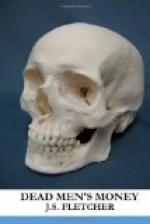He might have added that a deal of things may happen in two weeks—and, indeed, he would have had good reason for adding it, could he have looked a few days ahead.
CHAPTER XVIII
THE ICE AX
The police put Carter in the dock before a full bench of magistrates next morning, and the court was so crowded that it was all Mr. Lindsey and I could do to force our way to the solicitors’ table. Several minor cases came on before Carter was brought up from the cells, and during this hearing I had leisure to look round the court and see who was there. And almost at once I saw Sir Gilbert Carstairs, who, though not yet a justice of the peace—his commission to that honourable office arrived a few days later, oddly enough,—had been given a seat on the bench, in company with one or two other local dignitaries, one of whom, I observed with some curiosity, was that Reverend Mr. Ridley who had given evidence at the inquest on Phillips. All these folk, it was easy to see, were in a high state of inquisitiveness about Crone’s murder; and from certain whispers that I overheard, I gathered that the chief cause of this interest lay in a generally accepted opinion that it was, as Mr. Lindsey had declared to me more than once, all of a piece with the crime of the previous week. And it was very easy to observe that they were not so curious to see Carter as to hear what might be alleged against him.
There appeared to be some general surprise when Mr. Lindsey quietly announced that he was there on behalf of the prisoner. You would have thought from the demeanour of the police that, in their opinion, there was nothing for the bench to do but hear a bit of evidence and commit Carter straight away to the Assizes to take his trial for wilful murder. What evidence they did bring forward was, of course, plain and straightforward enough. Crone had been found lying in a deep pool in the River Till; but the medical testimony showed that he had met his fate by a blow from some sharp instrument, the point of which had penetrated the skull and the frontal part of the brain in such a fashion as to cause instantaneous death. The man in the dock had been apprehended with Crone’s purse in his possession—therefore, said the police, he had murdered and robbed Crone. As I say, Mr. Murray and all of them—as you could see—were quite of the opinion that this was sufficient; and I am pretty sure that the magistrates were of the same way of thinking. And the police were not over well pleased, and the rest of the folk in court were, to say the least, a little mystified, when Mr. Lindsey asked a few questions of two witnesses—of whom Chisholm was one, and the doctor who had been fetched to Crone’s body the other. And before setting down what questions they were that Mr. Lindsey asked, I will remark here that there was a certain something, a sort of mysterious hinting in his manner of asking them, that suggested a lot more than the mere questions themselves, and made people begin to whisper amongst each other that Lawyer Lindsey knew things that he was not just then minded to let out.




